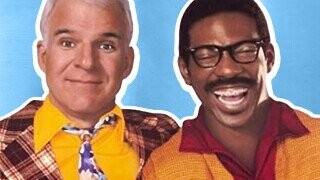‘Bowfinger’ and the Best Satires of Hollywood, Ranked

Hollywood filmmakers are good at two things: 1) Bringing entertaining movies to the masses; and 2) congratulating themselves for it — even doing so in some of said movies. For every 10 films about Hollywood glamorizing itself, there’s one that acts as a scathing satire of the industry’s inner workings. With Bowfinger currently streaming over on Peacock and Babylon dumping elephant poop on VOD, it’s time to look at the films that surveyed Hollywood's moving pictures landscape and said, “Well, we sure as hell can mock the s**t out of that.”
‘For Your Consideration’
While critical consensus at the time wasn’t particularly feeling this Christopher Guest movie and its crude, over-the-top nature, For Your Consideration is still better than most run-of-the-mill satires. As many Hollywood send-ups go, it takes shots at the egos of actors and filmmakers alike, but with a neat twist in that it’s all centered around Academy Awards hype. It might not read the same today, but watching the actors lose their minds whenever someone says “Oscar” is still a pretty good time.
‘State and Main’
One of Phillip Seymour Hoffman's tamer yet still brilliant roles, David Mamet’s satire looks at the chaos engulfing a film production as a first-time screenwriter tries to navigate the morally corrupt players involved. William H. Macy plays a deliciously diabolical director, and everyone’s on-point here in a movie that shows how easily folks can fall for the supposed glamor of filmmaking, even though it’s anything but.
‘Singin’ in the Rain’
From the juxtaposition of our lead character, Don Lockwood (Gene Kelly), talking about his “dignified” journey to stardom while the movie shows us quite the opposite, to his co-star, Lina Lamont (Jean Hagen), being told not to talk in public due to her screeching voice, this 1952 musical-comedy centers on cinema’s transition from silent films to the talkies. Light-hearted with a dash of romance, it remains the best on-screen musical film in cinematic history, poking fun at its industry one tap dance at a time.
‘The Player’
Robert Altman’s 1992 black comedy about a Hollywood producer who resorts to murder — thanks to that classic dose of pride and paranoia — is filled with Hollywood in-jokes and sees a whopping 65 celebrities making cameo appearances as themselves throughout. It also has one of the best opening scenes in satirical cinema history:
‘Bowfinger’
It’s not every day we can say, “Hey, look, everyone! A ‘90s movie that’s aged well!” Yet, here we are; Bowfinger not only holds up but is still one of Eddie Murphy’s best (double) performances to date. The movie delights in tackling everything from B-movies and high-profile studio deals to method actors and celebrity cults (a la Scientology). Better still, the jokes and general comedic delivery go a mile a minute without ever missing.
‘Mulholland Drive’
This creepy, dreamy masterpiece by David Lynch is, to put it mildly, a lot, and is by far the film with the most room for interpretation in here. What it clearly is, however, is a dark and surreal satirical look at the illusion of Hollywood stardom as an identity in any real sense. Moreover, it illustrates how the film business and Hollywood culture, in general, reads more like a fever dream than anything remotely resembling reality to normal people.
‘Tropic Thunder’
Famous for Tom Cruise's bonkers transformation and iconic dance scene at the end — as well as Robert Downey Jr. and Ben Stiller both purposely portraying wildly inappropriate characters — this 2008 action comedy deliberately went after every terrible Hollywood trope and gimmick we find in front of and behind movie cameras. Also, Jack Black playing an actor fueled by drugs and fart jokes is something to behold. The film received as much criticism as it did praise, mainly because it went hard on its mockery of the things Hollywood actors and filmmakers so recklessly and arrogantly believe they can get away with.
‘Barton Fink’
While the Coen Brothers are known for blitzing genres in a blender and seeing what comes out, most of their movies are sardonic in nature, with many of them either taking a stab at the romanticization of crime and politics (see Miller’s Crossing, Fargo, Burn After Reading), or gunning for the ridiculousness that is the movie industry. While Hail, Caesar! went after 1950s Hollywood (sort of), it wasn’t nearly the caliber of their 1991 black comedy, Barton Fink — a film greatly inspired by the Brothers’ own struggles in creating Miller’s Crossing. The movie ridicules the creation process through its titular character, a New York playwright hired by a Hollywood film studio to write screenplays, only to suffer from writer’s block and instead develop an obsession with hotel art.
‘Sunset Boulevard’
Named after Hollywood’s famous filmmaking street, this cheeky black-and-white 1950 dark satire film noir is as much about what happens when a filmmaking era concludes as it is about stardoms ending and fading into the ether. The fact that the movie is narrated by a dead screenwriter who got killed by a deluded and obsessive silent-era starlet makes it a ghoulish comedy film, especially for the 1950s. It also features one of the most famous movie quotes ever…
…as well as the best film opening involving a dead character floating in a pool like a lost Snickers bar.